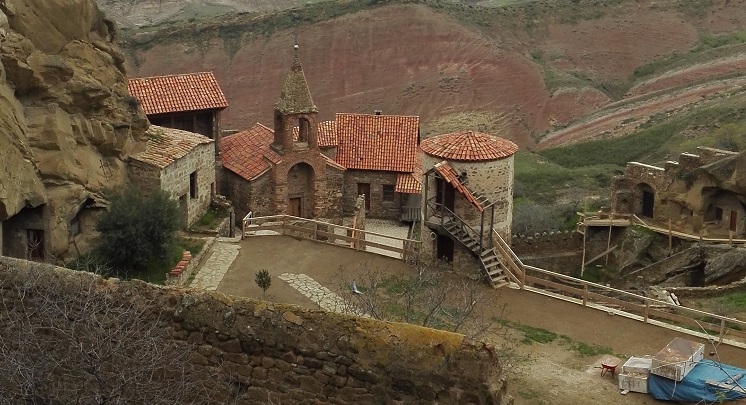Georgian patriarchate against making disputed section of David Gareji transboundary protected area

David Gareji, a sixth-century complex of 22 rock-hewn monasteries has more than 5,000 cells and cave-cells. Photo: Nino Alavidze/Agenda.ge.
The Georgian patriarchate is against the initiative of a group of Georgian scientists who offer making a disputed section of Georgia’s 6th-century monastery complex as a transboundary protected area.
The Georgian patriarchate says that the initiative would be positively evaluated by them if there were no obscurities on territorial issues with Azerbaijan, as Georgia and Azerbaijan have not agreed upon their borders since the collapse of Soviet Union back in 1991.
The patriarchate says that all the evidence points to Udabno and Chichkhituri monasteries of David Gareji being on the Georgian territory.
In a situation when there are historic, cultural, legal and cartographic materials that the two monasteries are on Georgian territory, offering the creation of a transboundary zone would be ignoring the materials and placing the territorial possession under a question mark,” the patriarchate said earlier today.
 Georgian Prime Minister Giorgi Gakharia (l) said after his meeting with Azerbaijani president in October this year that the Udabno and Chichkhituri monasteries of David Gareji monastery complex, which had been closed by Azerbaijani border guards since the beginning of the year, would reopen to Georgian clerics. Photo: government of Georgia press office.
Georgian Prime Minister Giorgi Gakharia (l) said after his meeting with Azerbaijani president in October this year that the Udabno and Chichkhituri monasteries of David Gareji monastery complex, which had been closed by Azerbaijani border guards since the beginning of the year, would reopen to Georgian clerics. Photo: government of Georgia press office.
The 200-page plan and initiative of a group of Georgia scientists proposed at the end of October aimed to ease David Gareji-related tension
The scientists believe that after granting the status to the cultural monument tension would be eased as both countries would receive economic and other benefits.
The situation has become tense several times at the site over the past several months, and was deescalated after the involvement of state officials from both countries.
David Gareji is a complex of 22 rock-hewn monasteries and more than 5,000 cells and cave-cells, located in Georgia’s south-east.
 Tweet
Tweet  Share
Share